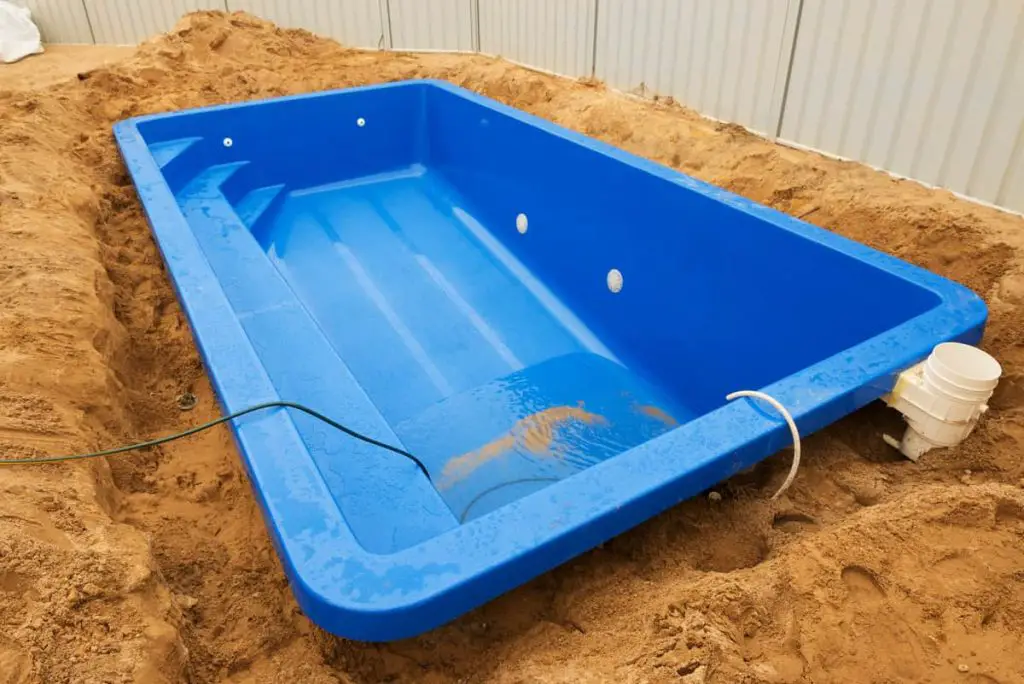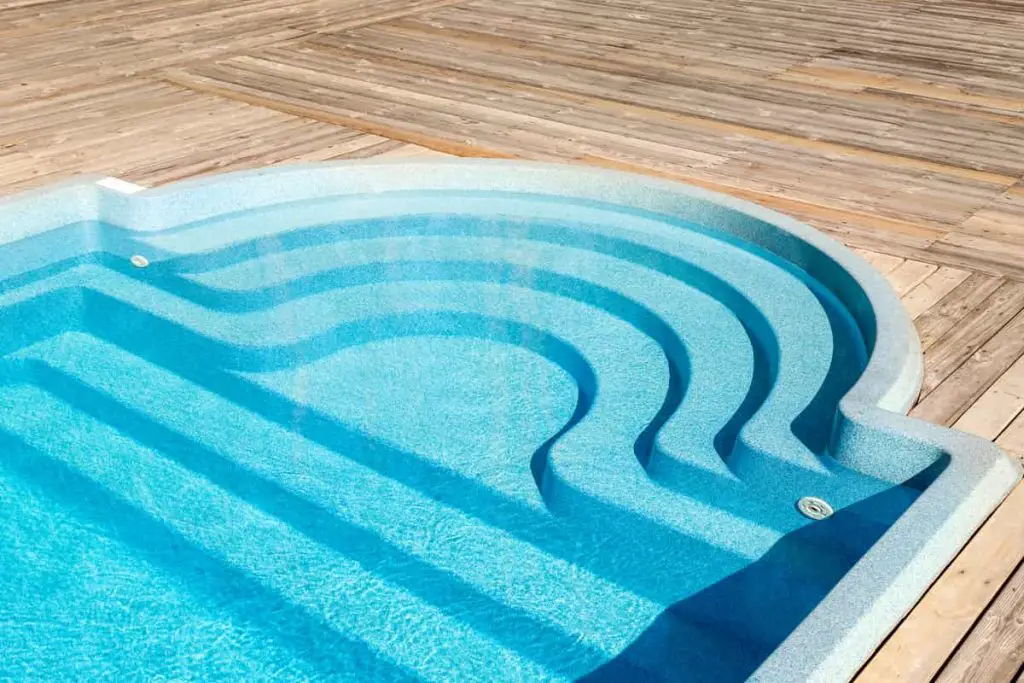As a Floridian, having a swimming pool in your backyard is ideal for beating the heat that persists here almost all year. Before you started researching, you had never realized there were so many types of pool materials. You decide to look into fiberglass pools. Are they right choice for your Florida home?
Fiberglass pools are a good choice for Floridians, but maybe not the best. The material is simple to maintain and can be built even with a high water table. However, the topcoat of fiberglass can peel and fade in the strong sun.
You might have more questions before you commit to a fiberglass pool for your Florida home. For instance, how much do these pools cost? What sizes are available? What’s the lifespan of fiberglass? Keep reading, as we’ll answer all those questions and more ahead!

Advantages and Disadvantages of Fiberglass Pools in Florida
First, let’s dive right in and discuss the pros and cons of a fiberglass swimming pool for your Florida home. Depending on which of these factors are most important to you, this section will either confirm your decision to get a fiberglass pool or make you rethink it.
Fiberglass Pool Advantages
Per the intro, here are some perks of a fiberglass pool.
- Installation speed: Is the Florida heat getting to you? It can take six to eight weeks for a gunite concrete pool to be ready. That’s a long time to wait! Fiberglass pool installation requires two to four weeks on average by comparison. You could have a new pool within a month, which is great.
- Fast maintenance: Although pool maintenance is a certainty, fiberglass pools are known for being easier to maintain than other swimming pool materials.
- Durability: The cost of a swimming pool isn’t cheap, especially for in-ground pools. If you commit to getting a pool for your Florida home, you want the assurance that it will last for a while. We’ll talk more specifically later about how long fiberglass pools last, but they’re quite durable.
- Above-ground or in-ground: You have your pick whether you want an above-ground or an in-ground fiberglass pool. If you have a higher water table in your area, you can get the fiberglass pool built with its rim over the ground to 18 inches.
- Nonporousness: Fiberglass is a nonporous material, so it’s adept at resisting microbes such as algae. Your pool will be less green year after year, saving you maintenance time.
Fiberglass Pool Disadvantages
Here are some fiberglass pool cons that Florida homeowners should keep in mind.
- Cracking: Fiberglass pools are prone to what is known as spider cracks since your pool is prefabricated. Spider cracks develop despite the topcoat that manufacturers use for fiberglass swimming pools. The cracks don’t make the pool unusable, but they do detract from its appearance.
- Peeling: The longer you have your fiberglass pool, the worse the damage from the unforgiving Florida sun will be. All that sun will cause the fiberglass topcoat to come off. When this topcoat peels, it will require specialty repairs that can be expensive.
- Warping: When installing a fiberglass pool, it comes as one singular piece. That piece can warp or bend while it’s being backfilled, which means it doesn’t fit in your pool exactly as it should. This warping, at the very least, is unattractive and, at worst, threatens the structural integrity of your pool.
- Water quality issues: You must always maintain your water quality with a fiberglass pool. If you go too long with a high pH, then each day, the gel topcoat wears down little by little.
How Long Do Fiberglass Pools Last in Florida?
You have to know, what is the average lifespan of a fiberglass pool? That’s anywhere from 20 to 50 years, depending on a few factors.
The higher the quality of the pool, the more longevity you’ll get out of it. That means choosing a reputable pool contractor. Not only do you want to take your time when selecting a company so your fiberglass pool will last longer, but because if you don’t, your pool can be all but destroyed.
As we mentioned in the last section, fiberglass pools come as single prefabricated pieces. The piece goes right into the area where the pool contractors dig up. Then the pool undergoes backfilling.
If the contractors don’t use pea gravel or sand when backfilling, then the fiberglass pool lacks the support it needs. This can cause the walls to collapse, or the shoddy job will affect basic pool functions like water cleanliness or circulation.
Even if your fiberglass pool is installed perfectly, it will need work several years in. Since your home is in sunny Florida, the topcoat will wear down more quickly.
Most fiberglass pool owners can wait upwards of 20 years before having to get the pool refinished. For you, it might be half that time or even less. After all, besides the sun wearing down the topcoat, it will also fade the appealing colors of your fiberglass pool. This, too, requires refinishing.
What You Can Do to Make Your Fiberglass Pool Last Longer in Florida
Although you can’t stop the sun from shining, you can protect your fiberglass pool from further damage outside of the Florida sun. Here’s what we’d advise.
1. Always Keep Your Fiberglass Pool Full
Water reflects the sunlight and can offset some of the sun fading that will inevitably happen to the fiberglass. When the pool is empty, then there’s nothing between it and the full brunt of the sunlight, so it will fade faster. The gel coat will also break down much sooner.
2. Use Your Pool Filter Daily
Cycling the water via your filter is also a good idea, especially if there are contaminants in the pool water that could degrade the fiberglass quality. Even if you’re not using the pool, run the filter at least once per day. Keeping your pool clean will improve the quality of your pool.
3. Test and Maintain Pool Chemicals
We mentioned before that a high pH could cause the topcoat of the fiberglass to break down early. Stay abreast of your pool water’s chemicals with regular tests. Adjust the chemicals if need be. For more information on maintaining pool chemicals, check out our Beginner’s Guide to Pool Water Chemistry.
4. Cover Your Pool When Not in Use
If you don’t mind throwing a cover over your swimming pool every day you don’t use it, this is a great method for protecting fiberglass. Your cover should be UV-resistant so the sun can’t get through the weave of the cover.
5. Only Use Pool Chemicals
Since fiberglass can be sensitive to natural changes in pool water chemistry, the material should not be exposed to other chemicals than those that go in a swimming pool.
What Kind of In-Ground Pool Is Best in Florida?
Hmm. You were pretty sure that you wanted a fiberglass in-ground pool for your Florida home, but now you’re having second thoughts. Is fiberglass really the best material for in-ground pools, or are there better ones?
Let’s take a look.
Concrete
Concrete is one such material you might consider. Like fiberglass, it’s very durable, with lifespans of over 50 years common with consistent care. The porousness of concrete means algae can become a problem, so you’ll have to flood the pool with chemicals to treat the algae.
The natural alkalinity of concrete will change the pH of your pool, as the water will have a slightly elevated pH compared to other pool materials. Regularly test your pool and top off chemicals more frequently to keep the pH within the desired level.
Vinyl
Vinyl isn’t a pool material itself but rather a liner material. It’s customizable like concrete, but the more unique the shape, the more expensive the pool will be.
We must mention that vinyl very much lacks the durability of concrete and fiberglass. All it takes is one tear for the liner to be ruined. You might get four years out of a vinyl liner and as many as nine years. Vinyl will fade from the sun.
Between vinyl, fiberglass, and concrete, we’d say that the former two are a better choice for Floridians.
How Much Do Fiberglass Pools Cost in Florida?
Before you can fully make up your mind about whether to get a fiberglass pool installed in your Florida home, you need to know what one of these pools will cost.
Per a private pricing list provided to us, here are the costs of fiberglass pools in Florida by size and shape. The numbers are circa 2019.
- 11 by 18: $29,550
- 12 by 21: $30,250
- 14 by 30: $39,350
- 16 by 45: $47,050
- 8 by 14: $21,950
- 10 by 19: $25,000
- 16 by 24: $45,500
- 12 by 25: $31,600
3 Helpful Tips for Floridians Buying a Fiberglass Pool
The price of a fiberglass swimming pool is within your budget, so you’ve decided to proceed with one of these pools for your Florida home. Here are some tips that will make your purchasing decision easier.
Research Pool Companies Extensively
Since fiberglass installation can cause very expensive structural issues, you shouldn’t choose just any pool contractors for the job, as we said before.
Ensure the contractors you employ are bonded, insured, and licensed. Ask about their professional background before you hire them. You can even request to see their license if that will give you more confidence in working with them.
Even a licensed and bonded contractor might not get installation perfect, but they’re far more likely to do the job correctly the first time. This can save you thousands of dollars in prevented repairs. You’ll also be able to enjoy your pool uninterrupted, as you won’t have to invite contractors back to your home to repair structural issues.
Go with a Simpler Fiberglass Topcoat
Multilayered fiberglass topcoats feature layers with colors and textures such as metal flakes. When combined, each layer makes an amazingly beautiful pool liner that you’ll appreciate each time you take a dip.
Well, until the layers begin fading from the sun, that is. Then a contractor has to match that specific layer, so the damaged area is uniform with the rest of the pool. These kinds of precision repairs can be costly, and considering how often you’ll need topcoat touchups not worthwhile.
Although a simpler fiberglass topcoat isn’t as pretty, it’s more economical and easier to repair. That will matter more in the long run.
Choose a Basic Shape
We’ve mentioned already that fiberglass swimming pools are prefabricated. An intricate fiberglass piece might not be as structurally secure as a basic shape. The intricate design could develop spider cracks.
As you’ll recall, spider cracks won’t cause the fiberglass pool walls to collapse, but they can be very unsightly. Friends and family who come swimming might not feel comfortable jumping into a pool full of spider cracks. Can you blame them?
The other issue with an intricate single-piece fiberglass pool is this. Its installation will be more challenging. Since fiberglass pool installation must go perfectly to prevent issues with your pool in the future, you want to make the contractors’ jobs as easy as you can.

Conclusion
Fiberglass pools are a suitable choice for Floridians since the material resists algae, feels smooth, and is quite durable. However, the topcoat of a fiberglass pool is going to peel, especially from sun exposure, so expect to have to get that fixed every few years.
Concrete is another more viable material that Florida homeowners should consider for their pool. The sun won’t do as much damage, so your pool could look better for longer!
